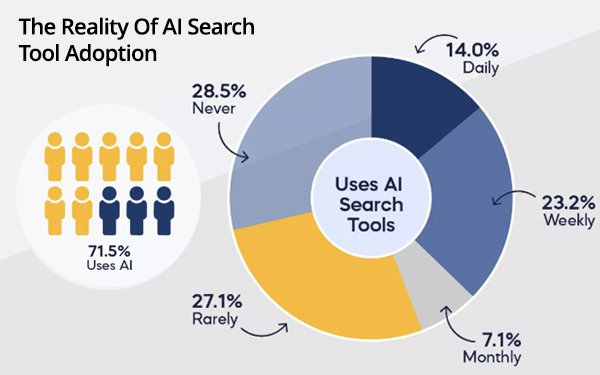
HigherVisibility released data Thursday
from a survey conducted in January that gives a nod to Google and Microsoft for integrating AI as a complement to classic search, rather than fully change the search model.
Search
behavior varies significantly based on the type of information required, with different platforms now dominate different types of queries. Preferences shift based on search intent, with traditional
search engines still dominating certain types of queries.
It’s likely that traditional search engines still dominate because paid media plays a major role in organic search strategies,
and many of the AI platforms have not fully developed advertising options.
Some 20.2% of those who participated in the survey have changed their primary search platform within the
last year, while 71.5% use AI tools for search of which 14% use it daily, and 79.8% prefer Google or Microsoft Bing for general-information searches.
advertisement
advertisement
The survey of 1,500 U.S. consumers
between the ages of 18 and 76, conducted in January, represents a variety of income levels and educational backgrounds, the company said.
The 2025 trends identified in the study are
interesting. People use different search platforms depending on the types of queries -- something BrightEdge identified late last year.
For general information, U.S. residents prefer classic
search. For initial products research, many will go to Google Search and Microsoft Bing.
Amazon, Walmart and Target seem to be the engines where consumers now start a product search, but when
it comes to comparing and recommendations of products, most use AI tools like Google Gemini, Anthropic Claude, and OpenAI ChatGPT.
For discovery-based shopping, consumers look toward social
platforms like TikTok, Instagram and Pinterest.
Niche platforms like Etsy and eBay tend to attract those looking for specialized product searches.
Google Maps and Business Profiles do
well for Local business searches. Social media like Facebook, Instagram, and Nextdoor are helpful for restaurants and entertainment. And Yelp and TripAdvisor are geared toward service-based
businesses.